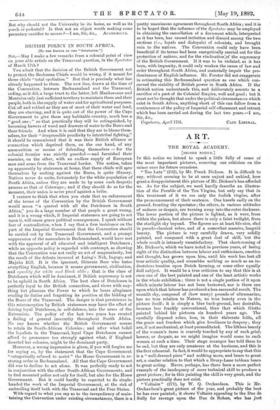BRITISH POLICY IN SOUTH AFRICA.
[TO THE EDITOR OF TEE "SPECTATOR."]
SIR,—May I make a few remarks from a colonial point of view on your able article on the Transvaal question, in the Spectator of March 17th ?
You admit that the decision of the British Government not to protect the Bechuana Chiefs would be wrong, if it meant for those chiefs "total spoliation." But that is precisely what has already happened to them. The new line, drawn at the time of the Convention, between Bechuanaland and the Transvaal, ceding, as it did, a large tract to the latter, left Mankoroane and Montsioa only just sufficient territory to maintain them and their people, both in the supply of water and for agricultural purposes. Cut off and robbed as they are of most of their water and land, they are starving, and it is quite out of the power of the Cape Government to give them any habitable country, much less a " good one ; " so that practically they will be extinguished, by becoming hewers of wood and drawers of water to the Boers and their friends. And when it is said that they are to blame them- selves, for their " irrepressible proclivity to intertribal fighting," it should be remembered that it was their British alliance or connection which deprived them, on the one band, of any ammunition or means of defending themselves — for the colonial frontier was strictly guarded—and furnished their enemies, on the other, with an endless supply of European men and arms from the Transvaal border. The notion, taken up apparently by statesmen at home, that these chiefs will save themselves by uniting against the Boers, is quite illusory. Natives never do unite, fortunately for the white population of South Africa, unless they are made to by some such despotic process as that of Cetewayo ; and if they should do so for the moment, their union is never proof against a bribe.
I venture to think that when you state that an enforcement of the terms of the Convention by the British Government would mean "a quarrel with all the Dutchmen in South Africa," you do a large number of that people a great wrong, and it is a wrong which, if Imperial statesmen are going to act upon it, will cause grave political consequences. I speak without fear of contradiction, when I say that a firm insistance on the part of the Imperial Government that the Convention should be carried• out by the Transvaal Government, and a prompt suppression of the marauders in Bechuanaland, would have met with the approval of all educated and intelligent Dutchmen ; while an opposite policy is regarded with contempt, as showing ' that the COnvention was not really an act of magnanimity, but the result of the defeats incurred. at Laing's Nek, Ingogo, and Majuba Hill. It is the ignorant, illiterate Boer who hates everything English, because it means government, civilisation, and equality for white and black alike ; that is the class of Dutchmen which will be dominant, if British supremacy is not to be upheld in South Africa. The best class of Dutchmen is perfectly loyal to the British connection, and views with any- thing but pleasure the Power to which he bears allegiance evading its duties and forgetting its position at the bidding of the Boers of the Transvaal. The danger is that persistence in this misconception by British statesmen may have the effect of driving loyal Dutchmen, in self-defence, into the arms of the Extremists. The policy of the last two years has created a feeling of general insecurity throughout South Africa. No one knows whether the British Government means to retain its South-African Colonies ; and after what befell the loyalists in the Transvaal, loyal Cape Dutchmen cannot afford to pronounce too strongly against what, if England deserted her colonies, might be the dominant party.
Moreover, a wrong impression is given, if you will forgive me for saying so, by the statement that the Cape Government "categorically refused to assist" the Home Government in re- storing order in Bechuanaland. All that the Cape Government did was to decline to act alone. It was perfectly ready to act in conjunction with the other South-African Governments, and to find mounted police not only for itself, but also for the Home Government. But it could hardly be expected to do single- handed the work of the .Imperial Government, at the risk of embroiling itself both with the Transvaal and the Free States.
With. regard to what you say as to the inexpediency of main- -taining the Convention under existing circumstances, there is a pretty unanimous agreement throughout South Africa ; and it is to be hoped that the influence of the Spectator may be employed in obtaining the cancellation of a document which, interpreted) as it has been, has caused irritation and discord among the two sections (i.e., loyals and disloyals) of colonists, and brought ruin to the natives. The Convention could only have been. beneficial if its terms had been energetically carried out for the• protection of natives, and for the vindication of the supremacy of the British Government. If it was to be violated, as it has been, with impunity, it could only weaken the cause of law and order throughout South Africa, and materially impair the pre- dominance of English influence. Mr. Forster did not exaggerate in estimating this Bechuanaland question as one which con- cerned the stability of British power in South Africa. If the British nation understands this, and deliberately assents to a sacrifice of a part of its Colonial Empire, well and good ; but it must not be thought that under the political circumstances which, exist in South Africa, anything short of this can follow from a. continuance of the policy of Imperial self effacement and retreat which has been carried out during the last two years.—I am, Sir, &c.,


































 Previous page
Previous page